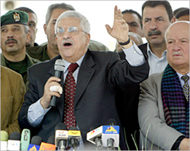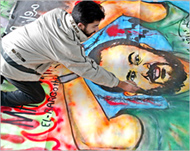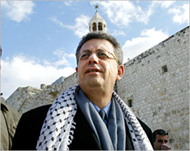No high hopes pinned on Palestinian election
As 3.7 million Palestinians prepare to go to the polls on 9 January to choose a successor to Yasir Arafat, a victory for Fatah candidate Mahmud Abbas seems very much a foregone conclusion.

According to the latest opinion polls, Abbas, also known as Abu Mazin, enjoys a safe and comfortable lead of more than 20 percentage points over his closest rival, independent candidate Mustafa al-Barghuthi, who has put up a surprisingly strong challenge judging by his election campaign.
However, it is by no means certain that Abbas will be elected by a crushing majority. A large chunk of voters are expected to stay away from the polling booths in deference to boycott calls by Hamas and other smaller groups.
Political observers say a poor turnout, below 50% for example, would hurt Abbas and help al-Barghuthi, whose supporters make up with motivation what they lack in numerical and organisational strength compared with the Fatah cadres campaigning for Abbas.
With election day approaching, all six contestants are giving the final touches to their respective campaigns and going all out to win over the estimated 10 to 15% of eligible voters who have yet to make up their minds as to whom they will vote for.
No illusions
The three independent Islamist or quasi-Islamist candidates – Abd al-Karim Shbair, Abd al-Halim al-Ashqar, who is under house arrest in the United States, and Sayid Baraka – are mainly counting on religious voters who intend to ignore the boycott call of Hamas.
 |
|
Fatah candidate Mahmud Abbas |
But none of them presumably has any illusions about their electoral prospects.
The same is the case with Palestine People’s Party candidate Bassam Salhi, who opinion polls say will likely win 2% to 3% of the vote.
To be sure, Abbas is not taking victory for granted. He has been strenuously working on refurbishing his image of a moderate, vulnerable to Israeli and US pressures and ready to compromise on core issues such as the status of Jerusalem and refugees’ right of return.
Campaigning in the Gaza Strip recently, the PLO chief said for the first time in recent memory that uprooted Palestinian refugees will return to their homes and former villages in what is now Israel, not to a future Palestinian state as much of the international community had come to understand.
‘Zionist enemy’
Furthermore, Abbas said he will never use force against Palestinian resistance fighters, a move repeatedly demanded by Israel and US President George Bush’s administration.
“They are freedom fighters and should live a dignified and safe life,” he said while campaigning in Rafah earlier in the week.
The next day, Abbas confounded his Western admirers once again when he spoke of Israel as the “Zionist enemy” after hearing of the killing of six Palestinian children from one family in Bait Lahiya by Israeli tank shelling.
 |
|
Fatah will be hard pressed to win |
Whether these utterances reflect Abbas’ actual views or were aimed at winning over sceptical voters remains to be seen. After all, his brief stint as prime minister in 2003 did not endear him to many Palestinians, who continue to doubt his ability to drive hard bargains with the Israelis or stand up to US pressure.
Still, Abbas has no dearth of messages to sell his candidacy in a political landscape devastated by four years of Israeli military and economic repression coinciding with al-Aqsa Intifada, and to a population traumatised by violence and privations.
Abbas is portraying himself as the only candidate capable of achieving Palestinian goals through political struggle. While Fatah officials are none too subtly reminding voters that he is the only Palestinian leader acceptable to the United States and the European Union.
‘Trusted leader’
Fatah’s advantages of incumbency have made Mustafa al-Barghuthi’s task all the more daunting. So he has sought to project himself – through hundreds of election meetings all over the West Bank and Gaza Strip – as a “more trusted leader … uncontaminated by the Oslo debacle”.
“Let us put the cause in trusted hands,” goes his main campaign slogan, a claim that his campaign officials hope will find a sufficient number of takers on election day.
 |
|
Al-Barghuthi has surprised |
Al-Barghuthi knows that as a political newcomer he has little chance of defeating Fatah’s Abbas. But he is aware none the less that if he can skim off a significant chunk of the votes on 9 January – between 25% and 30% – he would be achieving a victory of sorts.
And, while such a performance would not put him at the helm of the Palestinian Authority, it would still make him a force to contend with on the political scene.
This in turn might prompt him to form a centre-left party that could one day constitute a third force vis à vis the nationalist Fatah and Islamist Hamas.
To this end, al-Barghuthi, like the other independent candidates, will no doubt be hoping that many Hamas supporters will vote for him on 9 January.
Gloomy scenario
But such electoral calculations could yet founder on hard ground realities.
For one thing, Hamas officials in Gaza and the West Bank have reiterated their movement’s decision to boycott the election and refrain from supporting any of the candidates.
For another thing, the Palestinian intelligentsia is not convinced of the election’s relevance in the context of Israel’s continued occupation and military depredations.
 |
|
Few believe the election will put |
They believe that the mere act of electing a new president will not change the situation on the ground as has existed since 1967.
In their opinion, the election may be of considerable symbolic significance but is unlikely to make any practical difference to their condition, if recent history is any guide.
Palestinians across the political spectrum are all too conscious of the limits to Abbas’ ability to bring about an end to the injustices and oppression that have pushed the population to the edge.
These realists acknowledge that a free and fair election will be a “significant democratic asset” for Palestinians, indeed for all Arabs, but they rule out the possibility that the outcome will force Israel to take a strategic decision to give up the spoils of the 1967 war and allow the Palestinian refugee population, wholly or partly, to return to their homes.
Put bluntly, even the candidate with the bluest eyes and the sweetest manners will not be able to make Israel come to terms with Palestinians’ rights. This is a task that only the international community, especially the US, can accomplish.